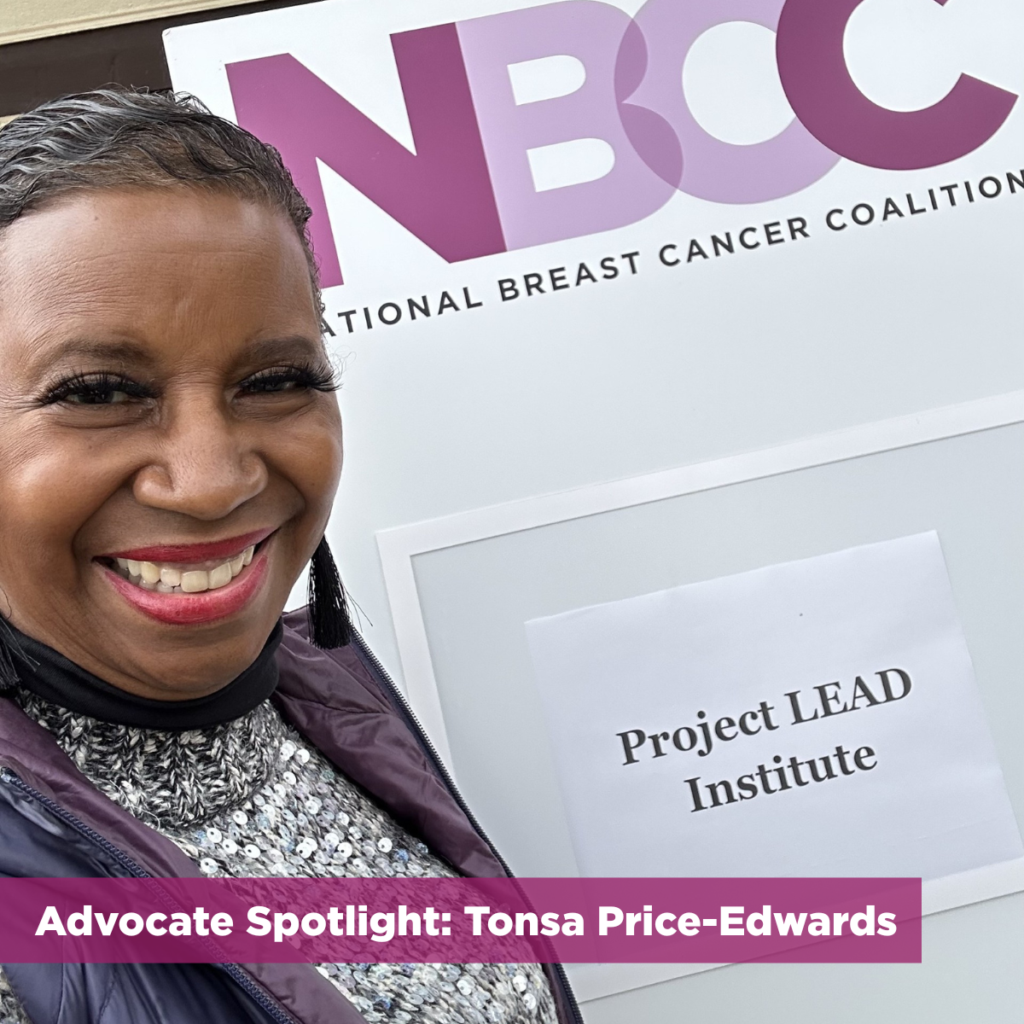 When Tonsa Price-Edwards was diagnosed with breast cancer in 2007, she never imagined that the disease would come back more than 10 years later as metastatic. She has since used her diagnosis to become an empowered patient advocate for change, especially within her community.
When Tonsa Price-Edwards was diagnosed with breast cancer in 2007, she never imagined that the disease would come back more than 10 years later as metastatic. She has since used her diagnosis to become an empowered patient advocate for change, especially within her community.
“Advocacy to me means I’ve been public as a woman of color. In the Black community, we hesitate to talk about breast cancer and the fact that we disproportionately die from breast cancer – it’s just devasting to see what it does to our community,” Tonsa said.
She’s right: despite lower incidence rates, research shows Black women are 41% more likely than white women to die of breast cancer.
She found herself becoming an NBCC advocate by following the science.
“Project LEAD intrigued me… I felt it was important to educate myself, and the notion of understanding the science of breast cancer and being a better advocate was something I wanted and I set my sights on,” she said.
Now a Project LEAD graduate, Tonsa credits the science training program for being the catalyst for her confidence to apply to serve as a peer reviewer for the Department of Defense Breast Cancer Research Program, a federally funded breast cancer research program launched in response to NBCC advocacy. She also says it was “empowering” to have Black women represented at Project LEAD, given the racial disparities that exist in the breast cancer field.
“The representation for me makes a difference as an advocate,” Tonsa said.
Her experience as a survivor and as someone whose cancer came back as metastatic shapes her sense of urgency to use what she learned and turn it into meaningful action.
“I link [research] to the reality of one in eight women getting breast cancer, which means I’m alive today because women did and tried things that maybe didn’t help them but helped me,” she said. “I feel that way now that I’m metastatic because when you’re first diagnosed, it’s about the pink ribbon and ringing the bell… they don’t really talk about the metastatic aspect, and I didn’t think about that when I was first diagnosed.”
That’s why, Tonsa says, we must ensure breast cancer research looks at “the long view,” as her gap in diagnoses highlights how much can change.
“The medications I’m on today didn’t exist when I first got diagnosed,” she said. “We have to move more toward quality of life and survival, and I want those who are in positions of power to make decisions so it shouldn’t be that people who are living with this disease don’t get the benefits they have worked for and deserve.”
Looking at the data, Tonsa knows that it’s more urgent than ever to pass the Metastatic Breast Cancer Access to Care Act, which would waive arbitrary Social Security Disability Insurance and Medicare waiting periods for eligible individuals with metastatic breast cancer.
“That waiting period is impossible because we don’t have that time, and we don’t have years waiting around while someone is checking off boxes,” she said. “Breast cancer is just as important as other illnesses and having to wait that long a period to access the benefits that you pay into and that you’re eligible for… it’s not a humane option.”
Tell your members of Congress to cosponsor this legislation
As she navigates her advocacy while living with breast cancer, Tonsa emphasizes that we must save the science that’s saving and improving the quality of life for people living with breast cancer.
“I am terrified of what’s happening to the landscape of science right now so it’s important to make our voices heard,” she said.